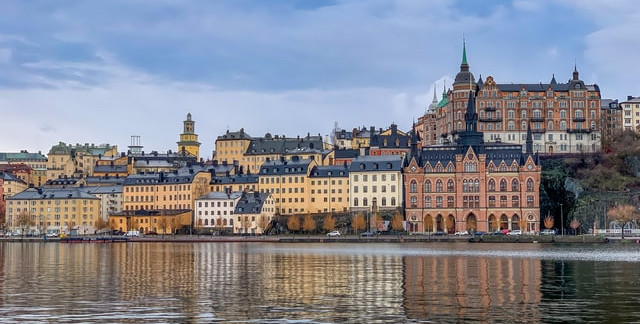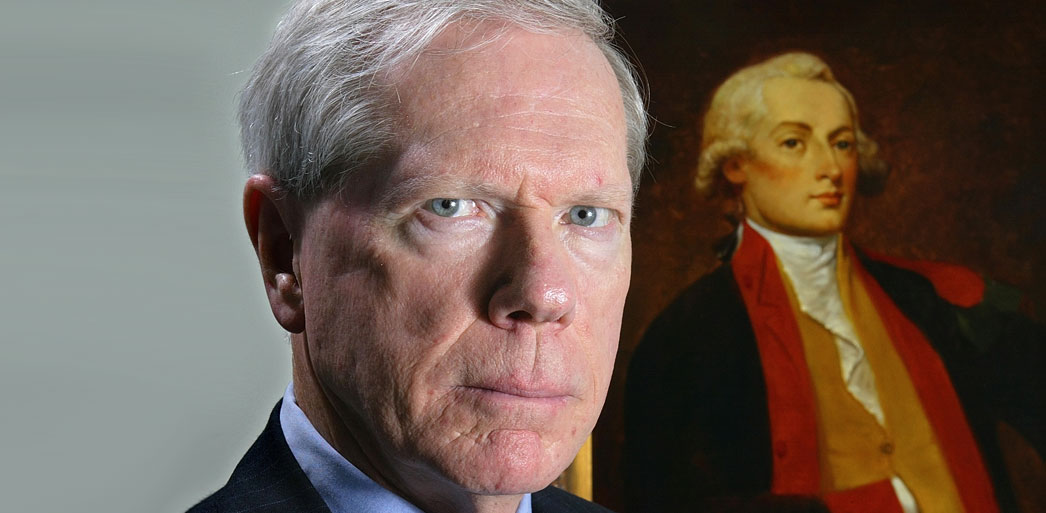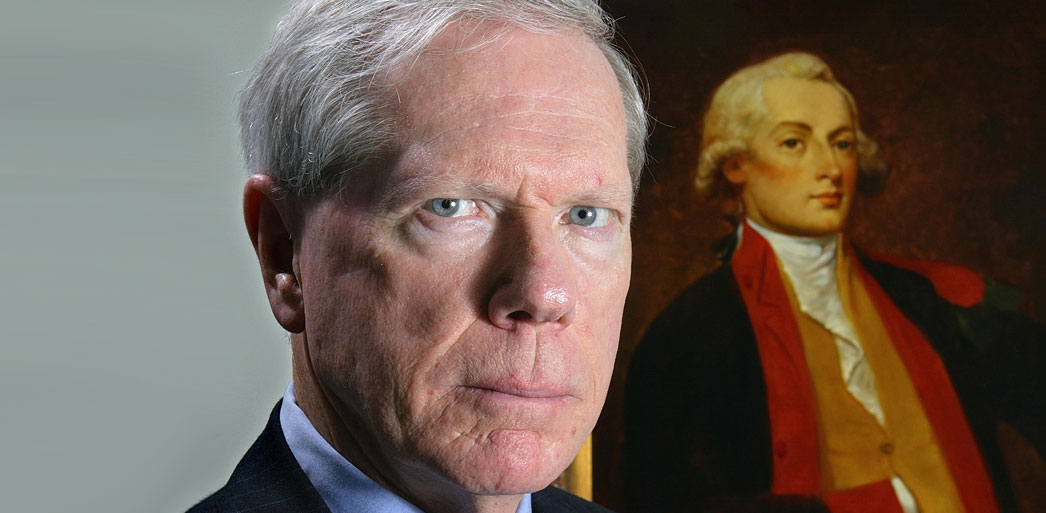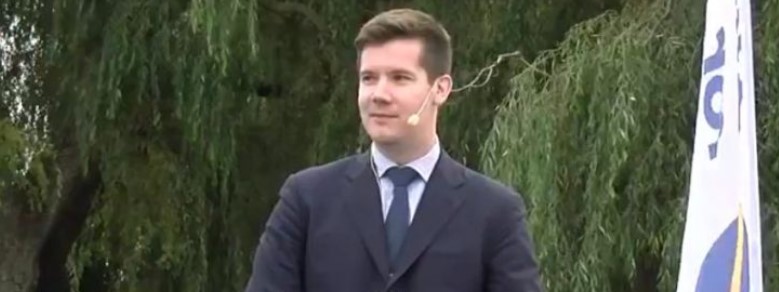One of the most striking things about the COVID-19 pandemic is just how dramatically different the responses have been from country to country. In early 2020, when little was known about the virus, this difference was unsurprising. Today, with tens of thousands of research articles and cases of best practice to learn from, one would expect to see more convergence.
And yet some countries continue to resist popular strategies, such as lockdowns, and insist on going their own way – with varying degrees of success.
Two such countries are Sweden and Japan, which in 2020 have forged a different path to their neighbours on coronavirus and attributed their early successes to the assumed advantages of an inherent national character. But today, both seem to be paying the price.
Lands without lockdown
One factor that features in both the Japanese and Swedish responses is that of national exceptionalism. By exceptionalism I mean the understanding among a population that “we” are not only distinct from the rest, but in some way also superior.
Leaders in both countries have emphasised that their constitutions prevent violations of civil liberties, such as lockdowns and fines. Instead, both governments have based their strategies on voluntarism, self-responsibility, and perhaps most importantly, the exceptional nature of their populations.
Sweden, famously, has left bars, restaurants and gyms open throughout the pandemic, as well as not requiring masks in any public settings. In fact, the official position in Sweden is still that masks may do more to increase the spread of COVID-19, rather than reduce it. This view was common in many European countries at the start of the pandemic, but other governments quickly changed their minds and mandated mask-wearing in public places.
Like Sweden, Japan took the “no lockdown” route and refrained from imposing mandatory restrictions – though it closed its borders earlier this year. Unlike Sweden, however, virtually everyone in Japan voluntarily wears a mask, and the government engages in aggressive contact-tracing.
Still, in July, Japan implemented a domestic tourism campaign, “Go To Travel”, to encourage people to spend money and boost the economy. It’s now feared that this campaign, which saw the government subsidise people’s domestic tourist trips, could be responsible for driving the country’s third wave.
Mindo and nihonjinron in Japan
Japanese exceptionalism was evident in the rhetoric used to explain the country’s relative success in mitigating both the first and second waves. In April, Prime Minister Shinzō Abe was quick to hail the success of the Japan model, which succeeded “in a characteristically Japanese way”.
Deputy Prime Minister Taro Asō was more explicitly nationalist: his explanation was that Japan’s mindo was higher than the rest. Mindo, loosely translated as “quality of people”, is associated with Japan’s imperial era, when the Japanese saw themselves standing atop a civilizational hierarchy of Asian people. This harks back to the discourse on Japanese exceptionalism, nihonjinron, which seeks to account for Japan’s uniqueness. All countries are unique, so it goes, but Japan is uniquely unique – and a little superior too.
The right-wing nationalist daily newspaper Sankei Shimbun even went as far to cite Japanese Shinto rituals and “the experience and wisdom of our ancestors” as explaining Japan’s success.
Exceptionalism in the Japanese case was of the particular kind: Japan succeeded thanks to the uniqueness of Japanese culture and cleanliness, the Japanese model approach would not work in other countries. However, exceptionalism and hubris are closely related, and the third wave engulfing Japan today under new prime minister Yoshihide Suga is proving more devastating than the first two.
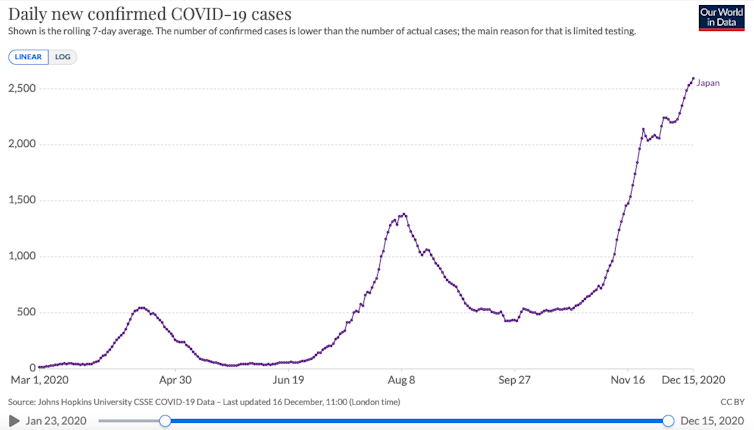
OurWorldInData
Folkvett in Sweden
In Sweden, rather than implement any mandatory restrictions, Prime Minister Stefan Lofven called on the populace to use their folkvett – a blend of good manners, morality, and common sense that is supposed to be innate to all good Swedes – to follow the voluntary recommendations.
Meanwhile, Anders Tegnell, Sweden’s state epidemiologist and architect of the country’s strategy, described the lockdowns in neighbouring countries as “mad” and “ridiculous”.
Johan Giescke, Tegnell’s mentor, close confidant, and consultant adviser for the Swedish Public Health Authority, was similarly outspoken: “Sweden is right” and “all the other countries are wrong”. Both Tegnell and Giesecke declared that COVID-19 was no more dangerous than a seasonal flu, and the Public Health Authority declared – incorrectly – in April, May, and July, that Stockholm was on the verge of herd immunity.
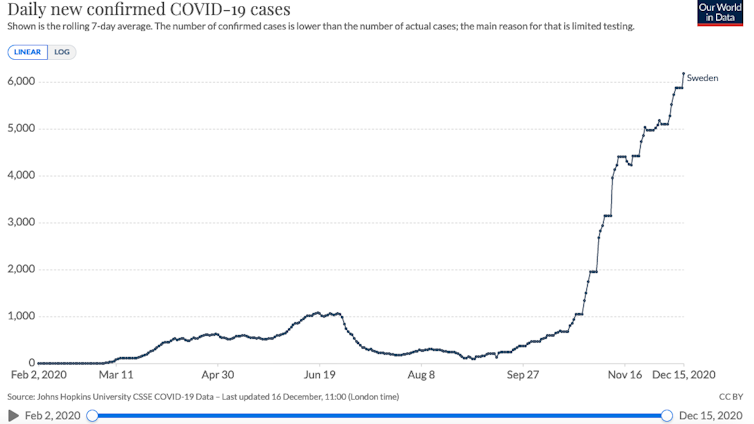
OurWorldInData, CC BY-SA
The Swedish media followed suit and Swedes were encouraged to be “proud to live in Sweden”, and not living under the populist and draconian responses to be found in the rest of Europe. To question the strategy was to question science and rationality itself.
After 22 prominent scientists published an article raised concerns about the Swedish approach, they were ridiculed in the media. Columnists and critics such as Ida Östenberg, Victor Malm and Alex Schulman launched personal attacks, with Schulman labelling them part of the tinfoil hat brigade. Even one of Sweden’s most famous and trusted science communicator, Agnes Wold, impugned their motives.
As the death toll increased into June, after the rest of Europe (and Japan) had regained control, only the far-right Sweden Democrats dared to criticise Tegnell or the Swedish Public Health Authority.
In late July, the daily deaths in Sweden finally reached single digits. This prompted less of a sigh of relief and more of a collective pat on the back. The Swedish strategy was correct, the Swedish strategy is being praised abroad. Indeed, it seemed that almost any favourable coverage of the Swedish strategy in the international press was newsworthy, as for example when British tabloid the Sun carried an article praising Sweden it was widely and approvingly reported on in the Swedish media.
Thus, Swedish exceptionalism was paradoxical: on one hand, it was based on the inherent folkvett of Swedes. On the other, Sweden very much touted the “Swedish strategy” as the correct scientific model from which all other states would eventually learn.
Exceptionalist inertia
The problem for both Sweden and Japan today is exceptionalist inertia. Other states were quick to change tack in tandem with developments in the pandemic and the science explaining it. Even as the third wave threatens to spiral out of control, the Japanese government has not cancelled “Go To Travel”, merely suspending it between December 28 and January 11.
Meanwhile, Swedish bars, restaurants and gyms remain open as the daily death toll continues to rise, though a new poll in the Dagens Nyheter newspaper shows trust in Tegnell is lower than ever among Swedes.
There is of course more to the COVID-19 story than national exceptionalism, and so far Japan has fared far better than Sweden and many other countries in containing its epidemic.
Still, both cases suggest that associating the success (and by extension, failure) of a public health response with an appeal to an exceptional national character can be dangerous. It can make learning from others less likely, and make changing course, even in the face of overwhelming evidence, a painful – perhaps impossible – process.![]()
Paul O’Shea, Senior Lecturer, Centre for East and South-East Asian Studies, Lund University
This article is republished from The Conversation under a Creative Commons license. Read the original article.





